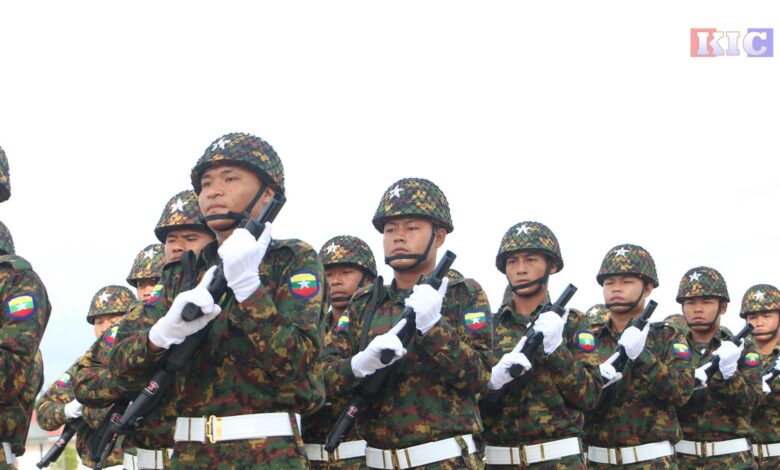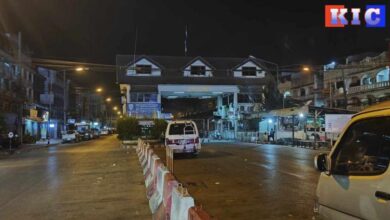Pay, Flee or Pay to Avoid Forced Military Conscription
Karen people have experienced more than 70 years of civil war. During that time young people have joined in the fight in their struggle against various Burma military regimes. In recent years the struggle became more complex with various factions forming militia sponsored and armed by the Burma Army. Karen News and its partner, Doh Athan talked with armed groups, families and conscripts about recruitment.

By Karen News
A mother of two adult sons now working in Thailand, explained why they left to avoid conscription. The woman still lives in Kawkareik Township, which is under the control of the military regime and its militia, the Border Guard Force.
Like others in the area, she said she has had to ‘protection money’ to various armed forces for many years.
“I don’t know anything about politics, but we gave money whenever they asked – 5,000 or 1,000 [kyat]. We don’t dare to question what it is was for – they were members of the BGF. They are armed… overpowered villagers, as they have arms. Some are rude and swore at us.”
The mother explained how conscription worked in the past and in the present.
“Each family has to pay different amounts ranging from K5,000 to K10,000, K20,000 and K30,000 [annually]. But I remember we were asked to pay K130,000 per household in 2018. As I could not afford it, I had to borrow to pay them. We have to pay a higher amount because we have adult sons in our family. Families that do not have adult sons do not have to pay as much as we do.”
Karen ethnic armed groups, including the Karen National Union, the Border Guard Force, and the Democratic Karen Benevolent Army (DKBA), need to recruit soldiers every year. They are reported to use both persuasion and coercion in the process. Since the 2021 military coup, villagers say the pressure for recruitment is now even greater.
Karen State, covers less than 5% of the country’s land area, has suffered more armed clashes since the coup than all other areas combined, according to ISP-Myanmar. Inevitably armed forces are incurring losses and need new recruits.
The Border Guard Force denies it uses forced conscription or extorts money, as BGF General Secretary, Colonel Saw Chit Thu explained.
“We neither conscript nor extort money in villages. It is a baseless accusation. [Given the current situation, anything can happen.] Last year, we provided two months of basic military training so that villagers can protect their villages. More than 300 people joined the training. (They now defend their villages by themselves). We armed them. But we don’t use them for other purposes. They are only used for the security of their villages.”
The Committee for Internally Displaced Karen People (CIDKP), said the reality is villagers are forced to go to the front line.
“The BGF didn’t say that they were recruiting soldiers at first. BGF said it was for the People’s Defense Force because otherwise they wouldn’t have joined. They also said villagers could stay at home and work in their fields. But later, some of them had to go to the frontline. The other day, someone was called to the front line and he dared not go. Then, he hired someone to go instead of him. Later they called him again to join the forces. Finally, he ran away to the border.”

A young man from Thaton district, who was conscripted into the Karen National Union in an administrative role, recently fled to Thailand.
“I fled two or three months ago because I didn’t want to work there anymore. They came to my house and made inquiries after I fled. They asked my father to work for them. But he is old, and there is no one else [in my family] to work on the farm, so they let him go back. My younger brothers still do not reach the age, so they can’t conscript them. But they said they would take them, if necessary.”
The Commander of KNU Brigade 1 admitted to conscripting local villagers, but pointed out that they don’t have to serve in a combat role. And he denied extorting money.
“Our policy is that each household must give a person. In some households, none of the family members wants to join. In that case, they have to find a substitute. It is like hiring a person. So, they have to pay him, and it has nothing to do with us.” The young man who recently fled to Thailand told Doh Athan of the money involved last year.
“If we don’t want to get drafted into the army, we can find a substitute. In that case, we
have to pay K15 to K18 million. It is a sort of payment made to the substitute. It is the final payment, and you do not need to make an annual payment anymore, and your family does not need to supply a recruit anymore. If you can’t find a substitute, and you also don’t want to get drafted, you have to pay K300,000 to K500,000 per year.
The KNU Commander argued more rural people should be joining the fight against the military regime.
“Though we conscript… under the current political situation, even young people from towns have come and are making sacrifices for the cause of democracy. Those who live in the countryside must also do this” A Burma Army officer explained how the military regime recruits.
“Young people are accused of a crime and given an option of jail or the army, many prefer jail, but it’s not an option. People sleeping rough at railway and bus stations are forced to join. Even jailed criminals are made to join. The standards are low.”
In the complicated patchwork of armed forces occupying different parts of Karen State, it’s hard to know what international rules apply around recruitment. Article 3 of the fourth Geneva convention prohibits committing outrages upon the personal dignity of civilians. And elsewhere the Convention prohibits an occupying power using civilians for uncompensated or forced labour, including work directly related to the conduct of military operations.
Saw Nandar Suu from the Karen Human Rights Group says if rules are followed, recruitment does not necessarily violate human rights.
“There are rules and regulations in place about military recruitment. There is an age limit. It must not be forced recruitment… If people are not forced, pressured, or intimidated, and they are allowed to choose fairly, it does not amount to human rights violation.”




